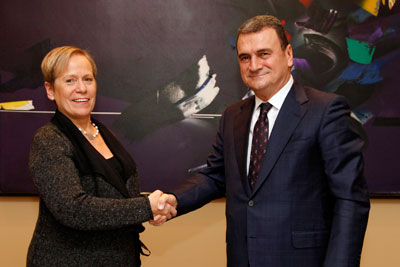UN Women signs agreement to foster economic and social empowerment in Turkey
Date:

In order to improve women’s economic and social empowerment in Turkey, UN Women’s Regional Office for Europe and Central Asia has signed a partnership agreement with one of the country’s largest industrial conglomorates, Koç Holding, which manages companies involved finance, energy, tourism, food, and information technology.
The agreement was signed on 10 December, International Human Rights Day, by UN Women Regional Director for Europe and Central Asia and Representative to Turkey, Ingibjörg Gísladóttir, and Koç Holding CEO Turgay Durak.
“We are very happy to add to our global advocacy work to advance women’s and girls’ rights in Turkey,” said Ms. Gísladóttir, emphasizing that women’s empowerment is essential for economic growth and progress in all spheres of life, along with the ending of harmful norms and practices that create barriers for women and girls. “We are all responsible for preventing all forms of discrimination against women and girls, and protecting and fully realizing all of their basic human rights. All positive cultural values that promote and protect women’s human rights should be revitalized,” Ms. Gísladóttir said.
Underlining that for many years Koç has carried out its corporate social responsibility projects with a rights-based approach, Mr. Durak said: “With a common understanding that the whole society will benefit from women’s empowerment, I believe that our work with UN Women will be an important added value for the society. We will be supporting this partnership with important projects to follow soon.”
In 2013, Koç Holding signed the “Equality at Work Platform”, initiated by Turkey’s Ministry of Family and Social Policies. The platform highlights the responsibility of the public and private sector to ensure gender equality is adopted, and that women are empowered to participate in the economy.
“We have carried on work that spread around the country empowering individuals and raising awareness, with the aim to offer equal opportunities in fields that we focus on,” Mr. Durak said. “We are happy to be adding to the work we have already started on women’s empowerment in economic life, with a new partnership.”